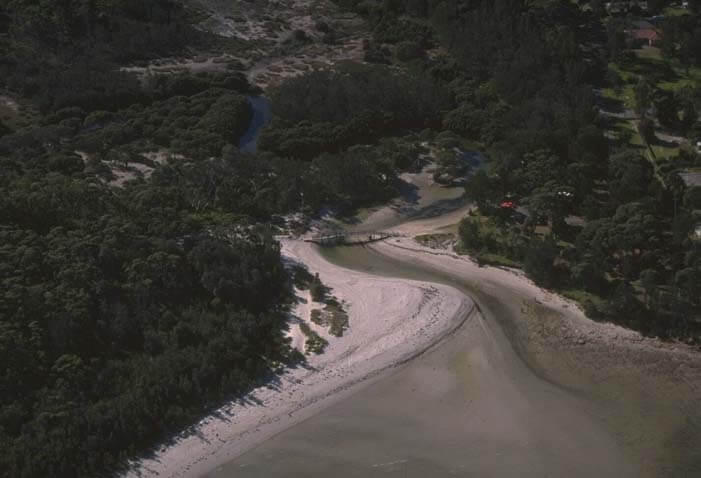Callala Creek is classed as a creek with an entrance that is intermittently open and closed to the ocean. The creek flows into Jervis Bay on the south coast of New South Wales and the estuary is part of the Jervis Bay Marine Park.
Water quality report card
As part of our water quality monitoring program we assess the water quality and ecosystem health of an estuary using a range of relevant indicators. We sample a subset of the estuaries between Wollongong and the Victorian border every 3 years. The most recent sampling in Callala Creek was completed over the 2023–24 summer, when 2 sites were sampled on a monthly basis.
This report card represents 2 water quality indicators that we routinely measure: the amount of algae present and water clarity. Low levels of these 2 indicators equate with good water quality. The numerical scores for these 2 indicators are averaged to give the overall grade.
Algae
Water clarity
Overall grade
The report card shows the condition of the estuary was good with:
- algae abundance graded good (B)
- water clarity graded good (B)
- overall estuary health graded good (B).
Grades for algae, water clarity and overall are represented as:
- A – excellent
- B – good
- C – fair
- D – poor
- E – very poor.
Go to estuary report cards to find out what each grade means, read our sampling, data analysis and reporting protocols, and find out how we calculate these grades.
We have monitored water quality in the Callala Creek estuary since 2011. This table shows the water quality grades for this estuary over that time.
| Year | Algae | Water clarity | Overall grade |
|---|---|---|---|
| 2023–24 | B | B | B |
| 2011–12 | C | D | D |
Physical characteristics
| Estuary type | Creek |
|---|---|
| Latitude | –35.01 (ºS) |
| Longitude | 150.72 (ºE) |
| Catchment area | 19.8 km2 |
| Estuary area | 0.006 km2 |
| Estuary volume | 0.9 ML |
| Average depth | 0.1 m |
Notes: km2 = square kilometres; m = metres; ML = megalitres.
Water depth and survey data
Bathymetric and coastal topography data for this estuary are available in our data portal.
Land use
The catchment of Callala Creek is moderately disturbed. About 15% of the catchment is used for urban development associated with Callala Beach, and the rest of the catchment is forested.
National and marine parks
- The largest conservation area in the catchment is Jervis Bay National Park.
- The Callala Creek estuary flows into the Jervis Bay Marine Park.
Citizen science projects
- The Budawang Coast Nature Map is an online data platform the community can use to record and identify biodiversity. Data collected is used to map the distribution of native plant and animal species from Moruya up almost to Kiama.
Community involvement
- Shoalhaven City Council’s Bushcare webpage provides links to a range of active groups in and around this catchment.
- The Shoalhaven Landcare Association represents a range of volunteer groups working in and around the Callala Creek.

Aerial view of Callala Creek
Seafood harvest area status
The NSW Food Authority website lists the current status of oyster/shellfish harvest areas.
Local government management
Local councils manage estuaries within their area. Where an estuary is attached to a marine park, marine park management teams are responsible for ensuring compliance with marine park zoning.
Shoalhaven City Council manages this estuary, which is located in Jervis Bay Marine Park.
Threatened species
The catchment of the Callala Creek estuary provides critical habitat for the endangered eastern quoll. A conservation program involves translocating this threatened species from Tasmania to this area.
Read more about the biodiversity in our estuaries.